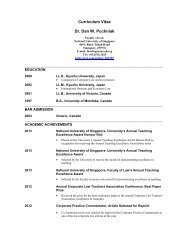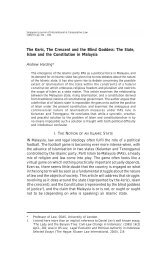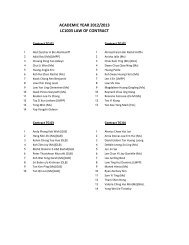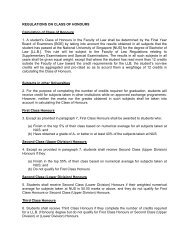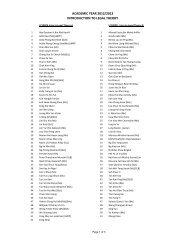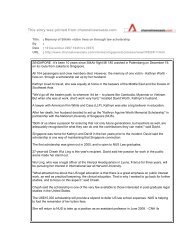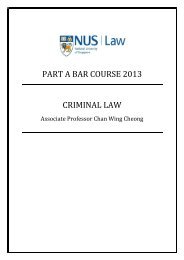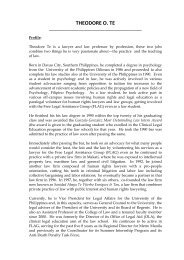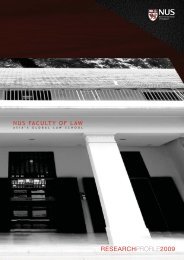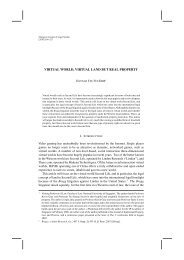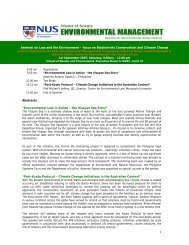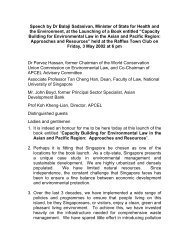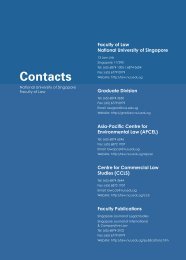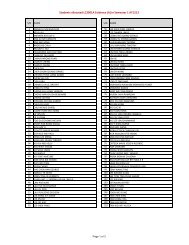Vol 7 No. 1 January - June 2008 - Faculty of Law - National ...
Vol 7 No. 1 January - June 2008 - Faculty of Law - National ...
Vol 7 No. 1 January - June 2008 - Faculty of Law - National ...
You also want an ePaper? Increase the reach of your titles
YUMPU automatically turns print PDFs into web optimized ePapers that Google loves.
[ <strong>Law</strong> School Highlights ]<br />
Excerpts <strong>of</strong> the Speech by<br />
The Honourable Attorney-General Mr Chao Hick Tin<br />
at the Book Launch <strong>of</strong> Elements <strong>of</strong> Family <strong>Law</strong> in Singapore and<br />
Criminal <strong>Law</strong> in Malaysia and Singapore held on 31 <strong>January</strong> <strong>2008</strong><br />
❝I am delighted to be with you this evening<br />
to celebrate the latest contributions to<br />
Singapore Legal Scholarship, the launch<br />
<strong>of</strong> two books. First is Elements <strong>of</strong> Family<br />
<strong>Law</strong> in Singapore by Pr<strong>of</strong>essor Leong Wai<br />
Kum and second, Criminal <strong>Law</strong> in Malaysia<br />
and Singapore by three authors jointly,<br />
Pr<strong>of</strong>essor Stanley Yeo, Dr Neil Morgan and<br />
Associate Pr<strong>of</strong>essor Chan Wing Cheong.<br />
Wai Kum is one <strong>of</strong> the long standing<br />
members <strong>of</strong> the <strong>Faculty</strong>. Ask any student<br />
and he or she will tell you that Wai Kum is<br />
synonymous with Family <strong>Law</strong>. Though she<br />
is now very much one<br />
<strong>of</strong> us, a Singaporean,<br />
she was in the seventies<br />
a foreign talent which<br />
we had attracted to<br />
these shores. She has<br />
devoted her academic<br />
pursuit all these 30 odd<br />
years to Family <strong>Law</strong> and<br />
all issues relating to<br />
women.<br />
She is the recognised<br />
authority on the subject<br />
in Singapore and has<br />
written extensively on<br />
it. Her works have been<br />
cited in judgments <strong>of</strong><br />
the Family Court, High<br />
Court and the Court <strong>of</strong> Appeal. But I should<br />
hasten to add that her interest in the subject<br />
is not purely academic. She has contributed<br />
to shaping the development <strong>of</strong> Singapore<br />
law. For example, in 1980, she made<br />
representations in her personal capacity to<br />
the Select Committee <strong>of</strong> Parliament on the<br />
Women’s Charter (Amendment) Bill 1979.<br />
Again in 1996, she made representations<br />
to the Select Committee on the Women’s<br />
Charter (Amendment) Bill 1996. A few<br />
years ago, she assisted my Chambers with<br />
her expert advice in the drafting <strong>of</strong> an<br />
internal paper on the legal status <strong>of</strong> prenuptial<br />
agreements. More recently in 2005,<br />
the discussion paper published by the<br />
<strong>Law</strong> Reform and Revision Division <strong>of</strong> my<br />
Chambers on the Review <strong>of</strong> Custody <strong>Law</strong><br />
quoted extensively from Wai Kum’s scholarly<br />
writings in the area <strong>of</strong> child custody law.<br />
Last year she was cited in the Parliamentary<br />
Debate on the Penal Code amendments<br />
as having made representations together<br />
with Associate Pr<strong>of</strong>essor Debbie Ong on<br />
the issue <strong>of</strong> widening the exemptions to<br />
marital immunity to rape. I understand<br />
that her representations were incorporated<br />
into the Penal Code amendments which are<br />
coming into force tomorrow. So she has<br />
not only contributed to the development<br />
<strong>of</strong> Family <strong>Law</strong> but also the development <strong>of</strong><br />
Criminal <strong>Law</strong>.<br />
Stanley is also a foreign talent. He did his<br />
basic law here at the law school. Upon<br />
graduation, he joined the <strong>Faculty</strong>. He<br />
pioneered the course “Administration <strong>of</strong><br />
I commend the <strong>Faculty</strong> for<br />
being at the forefront in<br />
promoting research and<br />
writings in various areas<br />
<strong>of</strong> the law.<br />
I congratulate law<br />
academics in general, and<br />
those on the NUS <strong>Faculty</strong><br />
<strong>of</strong> <strong>Law</strong> in particular, on<br />
their consistent research<br />
accomplishments.<br />
Criminal Justice” at the <strong>Faculty</strong> in the mideighties.<br />
I understand that it was then, and<br />
still is, one <strong>of</strong> the most popular subjects<br />
with the students. As a teacher, he is well<br />
regarded. Then, in the mid eighties, he<br />
left NUS to join an Australian <strong>Law</strong> School.<br />
In 2006, he returned to NUS. His last<br />
appointment in Australia before returning<br />
to Singapore was the Pr<strong>of</strong>essor <strong>of</strong> <strong>Law</strong><br />
at Southern Cross University. His special<br />
area is Criminal <strong>Law</strong> and Criminal Justice.<br />
Incidentally, Stanley is now an Australian.<br />
We need to work harder on him to make<br />
him become one <strong>of</strong> us.<br />
I ought to mention<br />
that in 2003, Stanley<br />
was awarded the LLD,<br />
Doctor <strong>of</strong> <strong>Law</strong>s by<br />
Sydney University for<br />
his contributions to<br />
legal scholarship in<br />
the area <strong>of</strong> criminal<br />
defences in the<br />
common law world.<br />
In 2002 at a speech<br />
delivered at Southern<br />
Cross University,<br />
Justice Michael Kirby<br />
<strong>of</strong> the High Court <strong>of</strong><br />
Australia paid Stanley<br />
the accolade <strong>of</strong> being<br />
“a world respected expert in criminal<br />
law”. In 2004, he was given the honour <strong>of</strong><br />
delivering the David Marshall Pr<strong>of</strong>essorship<br />
Lecture on the subject <strong>of</strong> “Reforming the<br />
Penal Code”.<br />
Upon rejoining NUS in 2006, Stanley agreed<br />
to write the chapter on Criminal <strong>Law</strong> in<br />
the “Annual Review <strong>of</strong> Singapore Cases”,<br />
a publication <strong>of</strong> SAL. His first contribution<br />
appeared in the 2006 issue <strong>of</strong> the Annual<br />
Review which was published mid last year.<br />
Turning to Dr Morgan, while I might not<br />
have met him before this evening, he is no<br />
stranger to Singapore. He taught for some<br />
three years at the <strong>Law</strong> <strong>Faculty</strong> from 1985 to<br />
1988. So those <strong>of</strong> you who did law at NUS<br />
during those years might well have had him<br />
as a teacher. Thereafter, he has returned to<br />
the NUS occasionally on shorter assignments.<br />
Dr Morgan is presently a Pr<strong>of</strong>essor <strong>of</strong> <strong>Law</strong><br />
at the University <strong>of</strong> Western Australia <strong>Law</strong><br />
School. Before this, he was the Director <strong>of</strong><br />
Studies at the Crime Research Centre <strong>of</strong> the<br />
same University. His area <strong>of</strong> specialisation<br />
is Criminal <strong>Law</strong>, including the question <strong>of</strong><br />
sentencing. His latest publications are in<br />
the area <strong>of</strong> mandatory sentencing. I should<br />
add that this is not the first time that Dr<br />
Morgan is venturing into an academic<br />
pursuit with local academic staff. In 1989,<br />
he co-authored with Emeritus Pr<strong>of</strong>essor<br />
Koh Kheng Lian a book on Criminal <strong>Law</strong>.<br />
Wing Cheong’s specialty relates to Criminal<br />
<strong>Law</strong> and Family <strong>Law</strong> and has written widely<br />
on the two subjects, including a monograph<br />
on “The Development <strong>of</strong> Criminal <strong>Law</strong><br />
and Criminal Justice in Singapore” which<br />
he co-authored. For some six issues <strong>of</strong> the<br />
Singapore Academy <strong>of</strong> <strong>Law</strong> Annual Review<br />
stretching over six years from 2000 to 2005,<br />
he contributed a chapter on Criminal <strong>Law</strong>.<br />
He is a regular speaker at conferences and<br />
forums on the two subjects close to his heart.<br />
He is a volunteer probation <strong>of</strong>ficer with<br />
the Ministry <strong>of</strong> Community Development,<br />
Youth and Sports (MCYS) in Singapore, for<br />
which public service he was awarded the<br />
Outstanding <strong>Vol</strong>unteer Award in 1999. He<br />
is also a volunteer mediator with the Family<br />
Court <strong>of</strong> Singapore.<br />
Family <strong>Law</strong> and Criminal <strong>Law</strong> are two <strong>of</strong><br />
the subjects which are <strong>of</strong> great interest<br />
to members <strong>of</strong> the public and, <strong>of</strong> course,<br />
equally so to the legal pr<strong>of</strong>ession. These<br />
two works will undoubtedly be very much<br />
welcomed by all who are concerned with<br />
the law. I commend the four authors for<br />
their industry in research and writing. I<br />
also commend the <strong>Faculty</strong> for being at<br />
the forefront in promoting research and<br />
writings in various areas <strong>of</strong> the law.<br />
I share the belief <strong>of</strong> many that there are<br />
universal general principles within the law<br />
but the details within the law will likely<br />
vary from one legal system to another. In<br />
Family <strong>Law</strong> and Criminal <strong>Law</strong>, in particular,<br />
the details would have to be finely tuned to<br />
suit local conditions and cultures. Academic<br />
works such as these two being launched<br />
today will guide and help the practising<br />
lawyers to understand the broad general<br />
principles as well as the fine local details.<br />
The legal pr<strong>of</strong>ession in Singapore is<br />
fortunately well served by the legal<br />
academia. I congratulate law academics<br />
in general, and those on the NUS <strong>Faculty</strong><br />
<strong>of</strong> <strong>Law</strong> in particular, on their consistent<br />
research accomplishments. I also<br />
congratulate LexisNexis for its contribution<br />
in the publication <strong>of</strong> these two books.<br />
<strong>Law</strong>Link 13



